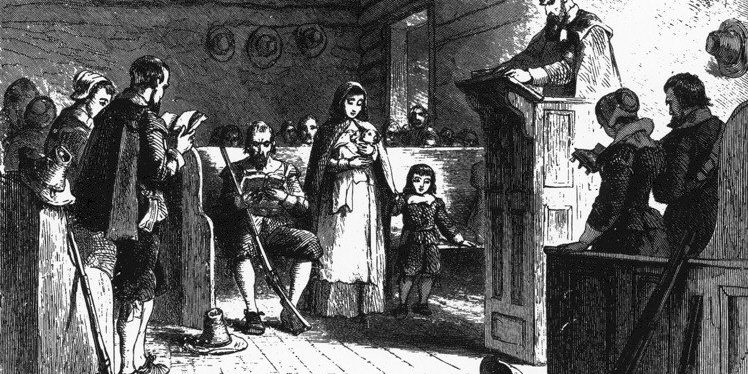
Learning to Preach from the Puritans
The Puritan movement from the mid-sixteenth century to the early eighteenth century has been called the golden age of preaching. Through preaching and publishing their sermons, the Puritans sought to reform their church, their hearers, and their nation at large. Though they ultimately failed to reform the Church of England, they succeeded in reforming everyday life, ushering in, as Alexander F. Mitchell says, “a season of spiritual revival as deep and extensive as any that has since occurred in the history of the British Churches.”[1]
The Puritans set high standards for themselves as preachers. They were men of their own times in many ways, but they embraced sound, enduring principles of proclaiming God’s truth that every Christian preacher should adopt as his own. Here are a few of the principles ministers in the twenty-first century can learn from the Puritans.
Preach Sermons that Are Biblical, Doctrinal, Experiential, and Practical
Sermons must be biblical, offering an explanation of the meaning of the text in its biblical and historical context; doctrinal, deriving and defining truths from the text about God and man; experiential, applying truths to the heart, and practical, giving specific directions for how to respond to God’s Word. The Puritans excelled in such comprehensive preaching. Consider, for example, the preaching of William Perkins (1558–1602) on Galatians 1:12, “For I neither received it [the gospel] of man, neither was I taught it, but by the revelation of Jesus Christ.”[2] Regarding the text, Perkins explained that Paul did not learn the gospel from a human teacher, but received it by revelation from Jesus Christ. This, Perkins said, confirmed the point of the previous verse that the gospel he preached did not come from man. As for his doctrine, Perkins taught the difference between ordinary revelation by the preaching of the Word and extraordinary revelation by supernatural means. He also taught the prophetic office of Christ, whom God sent to reveal the truth (Matt. 17:6; 23:8), call and send ministers to proclaim it (John 20:21; Eph. 4:11), and illuminate the minds of those hearing it (Luke 24:45). From this Perkins gave the following experiential and practical directions: (1) reverence the preaching of God’s Word, and carefully obey it, for Christ is our Teacher; (2) be warned that those who reject the gospel treat Jesus Christ with contempt, and will be damned for it; and (3) pray to Christ for understanding and submissive, believing hearts. Perkins gives preachers today an example of how preaching brings the whole Bible to bear on the whole person: head, heart, and life.
Preach the Whole Counsel of God
Over the years, ministers must preach through the whole system of divine truth revealed in the Scriptures so that God’s people are fully equipped to worship and serve him. Here again, the Puritans set an example for us to follow. Thomas Manton’s Works contain hundreds of sermons preached from every part of Scripture. A commitment to the whole counsel of God also appears in Manton’s balanced approach to doctrine. J. C. Ryle (1816–1900) wrote, “In Manton’s Calvinism there was a curiously happy attention to the proportion of truth. He never exalts one doctrine at the expense of another.”[3] Thus, Ryle notes, Manton preached particular divine election and general divine mercy over all creation, effectual calling and the universal call to repentance and faith, justification and sanctification, the comforting certainty of perseverance and the necessity of holiness. By his example, Manton teaches us that preachers, like housewives, should strive to feed the family of God with a balanced diet.
Preach So Ordinary People Can Understand
The Puritans rejected the practice of other preachers in the Church of England to adorn their sermons with long citations in Latin, Greek, and other languages in order to impress people with their learning. William Perkins asserted that “the properties of the ministry of the word . . . must be plain, perspicuous [clear], and evident, as if the doctrine were pictured and painted before the eyes of men.” Rather than using words that might impress the listeners but leave their minds uncomprehending, Perkins encouraged plain speaking: “the plainer, the better.”[4] Sinners are not converted by flights of rhetoric or displays of learning. Rather, like the Puritans, we today must preach the message of Christ with substance, clarity, and authority. Nothing puts fire into the sermon so much as holiness in the preacher. This was a hallmark of Puritanism. Click To Tweet
Preach with Your Life What You Preach from the Pulpit
There is no substitute for authentic godliness in the preacher. If his life contradicts his message, then his actions will speak louder than his words. Nothing puts fire into the sermon so much as holiness in the preacher. This was a hallmark of Puritanism. The Westminster Directory for the Publick Worship of God calls “the servant of God” to “perform his whole ministry” with the following qualities:
- diligence (“painfully,” as the old language puts it), as opposed to negligence;
- faithfulness, “looking at the honor of Christ, the conversion, edification, and salvation of the people, not at his own gain or glory”;
- impartiality, serving each person his gospel food without neglecting the lowly and poor or showing favoritism to the rich and powerful;
- wisdom, endeavoring to shape his work so as to be as effective as possible in doing God’s will, as opposed to being driven about by foolish passions or anger;
- dignity (“gravely”), as is fitting of a messenger of the Word of God, avoiding practice or mannerism that would give sinners the opportunity to despise him;
- love for God and man, so that people can see that everything he does comes “from his godly zeal, and hearty desire to do them good”;
- conviction of truth, as one deeply persuaded by the Holy Spirit that what he teaches and preaches is real, true, and the Word of God;
- exemplary conduct, “walking before his flock” as a model of what it means to follow in the pathways of the Lord, and keeping watch over himself;
- prayer, “earnestly, both in private and public, recommending his labors to the blessing of God” through petition and intercession.[5]
Conclusion
What can we learn from the Puritans? These godly men teach us to preach the whole of Scripture, read in the light of our own experience of its truth and power, making pointed application of it to the particular needs of our people. Such preaching is a high calling, John Owen said, which demands that it be carried out in the fear of the Lord “with a deep sense of that great account which both they that preach and they that hear the word preached must shortly give before the judgment-seat of Christ,” and yet it is a gracious calling, which we may perform in “a comfortable expectation” of God’s blessing on the Word and success if we are faithful.[6]
That’s what we want: “a comfortable expectation” that our preaching (or the preaching of our pastors if we are not preachers ourselves) will be blessed by God now and rewarded on the Judgment Day. Following in the footsteps of these Puritan preachers, ministers today can and ought to possess such an expectation.
Endnotes
[1] Alexander F. Mitchell, introduction to Minutes of the Sessions of the Westminster Assembly of Divines, ed. Alexander F. Mitchell and John Struthers (Edmonton: Still Waters Revival Books, 1991), xv. Parts of this article are adapted from my Reformed Preaching: Preaching God’s Word from the Heart of the Preacher to the Heart of His People (Wheaton, Ill.: Crossway, 2018).
[2] William Perkins, Commentary on Galatians, in The Works of William Perkins (Grand Rapids: Reformation Heritage Books, 2015), 2:43–46 (on Gal. 1:12).
[3] J. C. Ryle, “An Estimate of Manton,” in Thomas Manton, The Complete Works of Thomas Manton, D.V. (London: J. Nisbet, 1870–75), 2:xvii.
[4] Perkins, Commentary on Galatians, in Works, 2:148 (on Gal. 3:1).
[5] Westminster Directory of Public Worship, 96–97.
[6] John Owen, The Grace and Duty of Being Spiritually Minded, in The Works of John Owen, ed. William H. Goold (1850–1853; repr., Edinburgh: Banner of Truth, 1965), 7:263.
Consider reading Dr. Beeke’s article on Learning to Preach from the Reformers.

